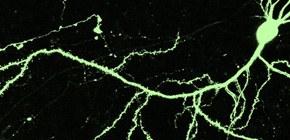
In vitro reproduction of long-lasting effects of stress on memory
Will lead to the development of therapeutic and preventive methods of stress-induced memory defects
A group of researchers led by Keiko Tominaga-Yoshino, Associate Professor at the Graduate School of Frontier Biosciences, Osaka University, reproduced the same phenomenon as memory consolidation by using organotypic slice cultures of the cerebral cortex and elucidated that stress interfered with memory consolidation.
This group had previously found that repeated stimulus to organotypic slice cultures of the cerebral cortex formed new synapses, which is the same phenomenon as the repetition-dependent memory consolidation process, and examined its mechanism.
In this research, the group elucidated that synapse formation is inhibited by the reproduction of stress known to cause memory defects.
Humans and animals have innate self-protecting mechanisms for alleviating stress. This is why it was difficult to determine if the results of animal experiments were affected by the stress applied by experimenters or by the effects from animals’ homeostatic response. Therefore, some conflicting results had been reported. However, in the in vitro system, the effects applied by experimenters can be directly examined.
As cultures can be maintained for a long period, it is possible to examine long-term effects. This group’s achievement will be useful for developing therapeutic methods for and preventive measures against stress-induced memory defects.
Abstract
Previously, in organotypic slice culture of rodent hippocampus we found that three repeated inductions of LTP, but not a single induction, led to a slow-developing long-lasting enhancement of synaptic strength coupled with synapse formation. Naming this structural plasticity RISE (repetitive LTP-induced synaptic enhancement) and assuming it to be a potential in vitro reproduction of repetition-dependent memory consolidation, we are analyzing its cellular mechanisms. Here, we applied a glucocorticoid to the culture to mimic acute excess stress and demonstrated its blockade of RISE. Since excess stress interferes with behavioral memory consolidation, the parallelism between RISE in vitro and memory consolidation in vivo is supported. We recently reported that RISE developed after stochastic processes. Here we found that the glucocorticoid interfered with RISE by suppressing the increment of dendritic spine fluctuation that precedes a net increase in spine density. The present study provides clues for understanding the mechanism of stress-induced memory defects.

To learn more about this research, please view the full research report entitled " An in vitro reproduction of stress-induced memory defects: Effects of corticoids on dendritic spine dynamics " at this page of the Scientific Reports website.
Related links
